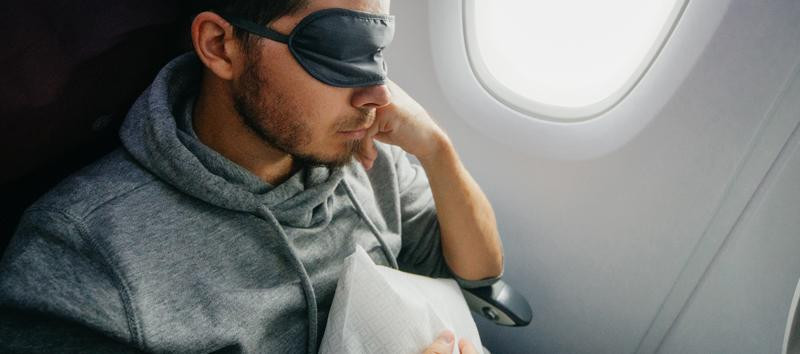Flying can be an ordeal even under the best circumstances. Navigating airport chaos, worrying about delays, and enduring cramped cabins can test anyone’s patience. But what if you’re also recovering from a head injury? Or perhaps you’re living with lingering symptoms from a concussion sustained weeks or even months ago? Is air travel safe, and what can you expect?
At Cognitive FX, located in Provo, Utah, we specialize in post-concussion syndrome treatment. Patients travel from all corners of the globe to seek our care, many arriving by plane. A frequent question we encounter is whether flying will worsen concussion symptoms. The reality is, it likely will, at least temporarily. The good news is that these effects are not usually permanent, and with the right strategies, you can minimize their impact.
Drawing on our extensive experience guiding patients through air travel before and after concussion treatment, this article will explore the potential challenges of flying after a concussion. We’ll discuss which symptoms are most likely to be aggravated by air travel and, crucially, provide actionable advice on how to mitigate these effects.
Is your recovery from a concussion taking longer than expected? At Cognitive FX, our average patient experiences a 75% improvement after focused treatment for post-concussion syndrome. To find out if our program is right for you, schedule a consultation.
Is Flying Safe After a Concussion?
Generally speaking, it is considered safe to fly after a concussion. However, the nature of air travel involves several factors that can be particularly challenging for someone with a brain injury:
- Intense Sensory Overload: Airports and airplanes are environments filled with bright fluorescent lights, loud noises, and bustling crowds crammed into confined spaces.
- Demanding Cognitive Tasks: Air travel requires quick decision-making, from navigating to your gate and finding food to understanding boarding announcements and managing unexpected changes.
- Stress and Disorientation: Flight delays, gate changes, baggage issues, and the general rush of air travel can induce significant stress and confusion.
For someone recovering from a concussion, these elements can easily lead to overstimulation and overwhelm. The effects of a concussion can impair normal brain function and decision-making, making the already stressful airport experience even more difficult.
It’s also important to consider the specifics of your injury. Was your concussion recent? Was it a traumatic brain injury? Are you experiencing post-concussion syndrome? Your answers to these questions will help determine how advisable flying is for you and what precautions you should take.
Flying with a Recent Concussion
Life doesn’t always stop for a concussion. Sometimes, travel is unavoidable even shortly after a head injury. Accidents happen while on vacation. Athletes may sustain concussions during competitions or training trips away from home. Business trips can lead to unforeseen incidents. There are many valid reasons why you might need to fly with a concussion.
With very few exceptions, it is generally safe to fly with a concussion.
What Does Research Say?
Research specifically on flying after a concussion is limited.
One small study involving collegiate athletes and military cadets who flew within hours of a concussion found that air travel did not worsen symptom severity or prolong recovery compared to those who did not fly immediately after injury.
Conversely, a study of NHL players who flew within six hours after a game in which they sustained a concussion showed a slightly longer recovery period. These players missed approximately one-third more games than those who did not fly right after injury. The study authors suggested that factors like reduced oxygen levels during flight and insufficient brain rest post-injury might contribute to this difference.
The Importance of Sleep for Concussion Recovery
 A man resting on the plane with an eye mask covering his eyes.
A man resting on the plane with an eye mask covering his eyes.
Adequate, high-quality sleep is vital for concussion recovery. During sleep, the brain clears out toxins that accumulate during waking hours. Research has shown a direct link between better sleep quality and improved brain function after a brain injury.
(If you are struggling with sleep issues after a concussion, our article on post-concussion syndrome and sleep offers helpful insights and strategies.)
Feeling Fine Right After a Concussion? Be Cautious
Even if you feel relatively well immediately after a concussion, you could still experience a delayed onset of symptoms. This isn’t necessarily caused by flying itself, but rather a common characteristic of concussions where symptoms may not fully manifest for days or even weeks after the initial injury.
Alternatively, your initial symptoms might be mild, but the taxing environment of air travel could push your brain beyond its current capacity, triggering symptom emergence. While sudden onset of severe symptoms mid-flight is uncommon, it’s important to be aware of the potential stressors and symptoms associated with air travel, which we will discuss in more detail later.
Flying with Post-Concussion Syndrome (PCS)
If your mild traumatic brain injury (mTBI) occurred several weeks ago or longer, and you are still experiencing ongoing symptoms, you may be dealing with post-concussion syndrome. (For a comprehensive understanding of this condition, refer to our Complete Guide to Post-Concussion Syndrome.)
Post-concussion syndrome develops when the brain doesn’t return to its normal, efficient functioning after a concussion. Instead, it becomes stuck in less efficient pathways it adopted to cope with the initial injury. This results in persistent concussion symptoms that can be present daily or flare up when triggered by stressors.
It is safe to fly with post-concussion syndrome, but be prepared for a likely temporary worsening of your symptoms. We encourage our patients not to let fear of symptom aggravation prevent them from traveling for important reasons, whether it’s seeking treatment or attending significant life events.
It’s crucial to remember that prolonged suffering with PCS symptoms can lead to the brain becoming more accustomed to these inefficient patterns, making recovery more challenging in the long run. Enduring temporary symptom increases to access treatment or attend to important matters is often a worthwhile trade-off. Taking proactive steps to minimize symptom exacerbation during travel is key.
Are you experiencing persistent concussion symptoms? Patients at Cognitive FX typically see a 75% average improvement after treatment for post-concussion syndrome. Discover if you are a candidate for our program by scheduling a consultation.
When Flying Might Not Be Advisable
While generally safe, there are situations where flying after a concussion is not recommended, or at least requires consultation with your doctor. Following a severe traumatic brain injury (TBI), immediate air travel might be contraindicated. For instance, injuries involving a skull fracture or significant bleeding necessitate close medical guidance regarding air travel. Always prioritize your physician’s advice in such cases.
Another common-sense guideline is to avoid flying when you are acutely ill. This applies to everyone, regardless of concussion history. Traveling with a fever or flu is detrimental to your health and inconsiderate to fellow passengers.
Which Concussion Symptoms Can Worsen When Flying?
Realistically, any of your concussion symptoms could be exacerbated by air travel. Here, we’ll highlight some of the most commonly reported symptoms that tend to worsen during and after flying:
- Headaches: Headaches are a hallmark symptom of concussions. The sensory overload inherent in airports and flights, including the cacophony of voices, constant announcements, fluorescent lighting, and in-flight light changes, can all contribute to headache intensification.
- Anxiety: Anxiety and even panic attacks can be triggered by the same factors that worsen headaches: overstimulation, noise, motion, and lighting. For many, flying itself is inherently stressful. If anxiety is already a concussion symptom, the added stress of air travel is likely to amplify it.
- Pain and Tension: Persistent neck and shoulder pain frequently accompany concussions, often co-occurring with headaches. The uncomfortable seating and prolonged postures during flights can worsen musculoskeletal pain and tension.
- Extreme Fatigue: Overstimulation places significant demands on a concussed brain, leading to rapid fatigue. Furthermore, disrupted sleep patterns before, during, and after flights – a common issue for all travelers – can significantly exacerbate fatigue, especially when crossing time zones.
- Nausea and Vertigo: Nausea and vertigo following a concussion are often linked to vestibular system dysfunction. The vestibular system in the inner ear is crucial for balance and spatial orientation. Navigating crowded airports, especially moving crowds, can trigger vertigo and headaches in some individuals. Escalators can also be problematic. Altitude changes and turbulence during flight can further challenge a compromised vestibular system. Even walking to the restroom during flight can induce nausea and vertigo due to instability.
- Feeling Overwhelmed: A brain recovering from a concussion tires easily, leading to feelings of being overwhelmed. Decision-making becomes significantly more difficult, and tasks like navigating security, finding your gate, and dealing with flight disruptions can become surprisingly challenging.
How to Minimize Concussion Symptoms While Flying: Proactive Strategies
As Benjamin Franklin wisely said, “An ounce of prevention is worth a pound of cure.”
Whether you’ve recently sustained a concussion or are managing post-concussion syndrome, our experience at Cognitive FX has shown us that proactive planning and preventative measures are crucial for minimizing concussion symptoms during air travel.
This section provides practical strategies to implement before, during, and after your flight to alleviate potential symptom exacerbation.
Pre-Flight Planning is Key
Thorough pre-flight planning is paramount for minimizing concussion symptoms during air travel. The more decisions you make in advance, the smoother your journey will be.
- Enlist a Travel Companion: If possible, travel with a companion. They can provide support, keep you on schedule, and assist if you feel overwhelmed.
- Utilize Airport and Airline Disability Services: If traveling alone, explore the resources offered by airports and airlines for passengers with disabilities. You can arrange for assistance with baggage, security, and gate navigation. Early boarding is often available, reducing stress and confusion. Typically, you need to indicate this need when booking your flight, but contacting the airline or airport in advance is always recommended to confirm available services. You can find more information on the Department of Transportation website.
- Consider Upgrading Your Seat: If your budget allows, consider booking Business Class or First Class. These cabins offer more comfortable seating, increased space, and a quieter environment.
- Create Checklists: Prepare comprehensive packing and to-do lists. Checking items off as you complete them provides a sense of control and reduces mental strain.
- Develop a Daily Schedule: Outline your schedule upon arrival and throughout your stay. A structured daily plan minimizes uncertainty and stress.
- Plan Your Meals: Pre-planning meals can significantly reduce stress. Decide where, when, and what you will eat. One of our patients, Olivia Seitz, who stayed in an Airbnb with a kitchen during treatment, created a detailed menu and shopping list for her entire stay. Her husband handled shopping and cooking, ensuring she had healthy meals and could focus on treatment and rest.
- Carefully Consider Transportation Options: In many locations, renting a car is common. However, unless you have someone who can drive for you, carefully evaluate alternative transportation. Navigating unfamiliar roads and traffic patterns in a new place can be stressful for anyone, and particularly challenging with concussion symptoms. Public transportation, ride-sharing services, or airport shuttles might be less taxing options.
- Schedule Post-Arrival Rest: Build in dedicated rest time immediately after arriving at your destination to recover from travel fatigue and any symptom flare-ups before engaging in your travel purpose.
Time Zone Changes and Concussion Recovery
If your flight involves crossing time zones, jet lag can significantly impact sleep and medication schedules, both crucial for concussion recovery.
Sleep Adjustment
To minimize jet lag disruption, gradually adjust your sleep schedule in the days leading up to your flight. Shift your bedtime and wake-up time in 30-minute increments to start acclimating to your destination’s time zone.
If you are considering using sleep aids during your trip, consult your doctor beforehand to ensure they are safe and appropriate for you.
Jet lag can make sleep challenging, but preparation is key. Resources like SleepFoundation.org offer valuable tips for managing jet lag and improving sleep while traveling.
Medication Management
 A photo of a pill organizer box
A photo of a pill organizer box
If you take medications, plan ahead for managing them across time zones.
For medications taken at specific times daily (e.g., 7 AM and 7 PM), you may need to gradually adjust your dosage times to avoid significant shifts.
For medications that must be taken at the same time regardless of time zone (consult your doctor about this), set alarms to avoid missed doses as you adjust to the new time zone.
Using a pill organizer box during travel can help prevent confusion and ensure you take your medications correctly.
Finally, be aware of any medication side effects, such as drowsiness or alertness, as these can further disrupt your sleep schedule at your destination.
How to Minimize Concussion Symptoms During the Flight
The following suggestions are beneficial for all travelers, but particularly crucial for those flying after a concussion or with persistent concussion symptoms:
- Stay Hydrated and Eat Nutritiously: Proper hydration and nutrition are essential. Avoid sugary snacks and sodas. Drink plenty of water and pack healthy snacks like fruits, vegetables, nuts, or protein bars for the flight.
- Avoid Alcohol and Caffeine: Refrain from alcohol and caffeine before and during your flight, as these substances can worsen concussion symptoms and disrupt sleep.
- Manage Noise Sensitivity: If you are sensitive to noise, use high-quality earplugs or noise-canceling headphones to minimize auditory overstimulation. Consider listening to calming nature sounds or binaural beats (like Brainwaves, which many of our patients find helpful) to promote relaxation.
- Manage Light Sensitivity: If light sensitivity is a symptom, wear sunglasses or an eye mask during the flight to reduce visual stimulation.
- Practice Anxiety Management: If anxiety arises, focus on your breathing. Engage in diaphragmatic breathing (deep belly breaths) rather than shallow chest breathing. Try meditation or mindfulness techniques to stay calm.
- Prioritize Hygiene: Take precautions to avoid illness. Wash your hands frequently and consider wearing a mask, especially in crowded areas.
- Anticipate Symptom Triggers: Be mindful of situations that might exacerbate your symptoms, such as navigating the narrow airplane aisle to use the restroom.
- Take Your Time Deplaning: Unless necessary, don’t rush to deplane, especially if you are traveling alone and haven’t arranged for assistance. If you have requested airline assistance, someone will meet you at the aircraft door.
Post-Flight Recovery at Your Destination
Upon arrival, rely on your pre-flight plan. Prioritize rest and allow yourself time to stabilize before engaging in your travel activities. Maintain a healthy diet, prioritize sleep, and don’t hesitate to ask for help when needed. Finally, be patient with yourself. Travel places considerable stress on the brain, especially one recovering from a concussion.
Final Thoughts
Flying safely with a concussion is achievable with realistic expectations and thorough preparation. While air travel is inherently stressful and tiring for anyone, it can be significantly more challenging with concussion symptoms. However, by implementing proactive planning and symptom management strategies, you can minimize symptom severity and confidently undertake necessary travel. Don’t let a concussion ground your travel plans.
Note: Are you still struggling with concussion symptoms? On average, patients at Cognitive FX improve by 75% after our specialized post-concussion therapy. To determine if you are a suitable candidate for treatment, schedule a consultation.
